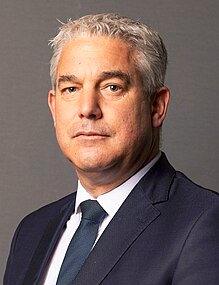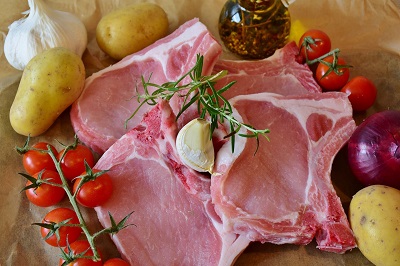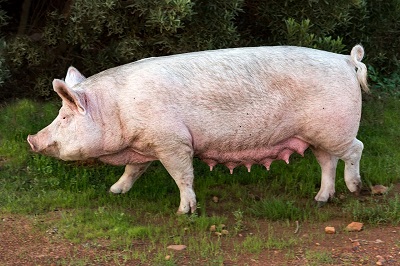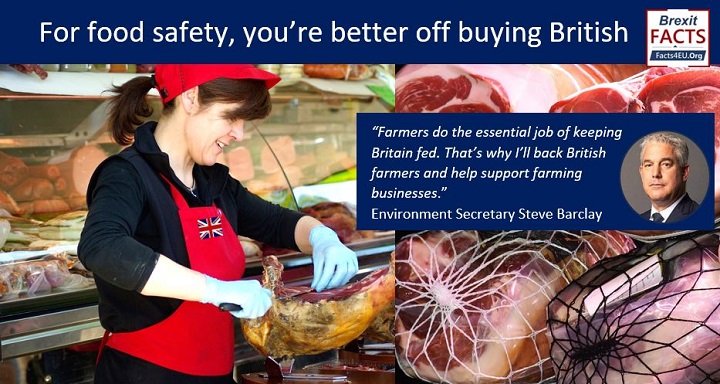For food safety, you’re better off buying British
If the packaging says ‘Not For EU’ that’s a good thing
Montage © Brexit Facts4EU.Org 2024
Facts4EU.Org must once again educate Rejoiners on the UK’s higher food safety standards
Extremist Rejoiners are all over the Internet right now, wailing about new labels on UK supermarket products which have started appearing, saying “Not For EU”. They seem to think the EU has higher food safety standards than the UK and if they buy these ‘not for EU’ products they will be at risk.
In fact the opposite is the case – as we have reported many times over recent years. The reason for the labels is simply because the EU has cut Northern Ireland off from the rest of the United Kingdom, for absolutely no good reason.
In this short series we attempt once again to show Rejoiners just how far behind the EU is compared to the UK, when it comes to food safety and animal welfare.
A Brexit Facts4EU.Org Series
Part I – The EU’s food safety standards are lower than those in the UK - This report
Part II - The EU’s chicken and egg scandal
Part III - The EU’s appalling standards on animal welfare
On Thursday (04 Jan 2024) Environment Secretary Steve Barclay said:
“Farmers do the essential job of keeping Britain fed. That’s why I’ll back British farmers and help support farming businesses.
“We have listened to farmers’ feedback and set out the biggest upgrades to our farming schemes since leaving the EU, with more money, more choice and more trust to support domestic food production whilst also protecting the environment.”

Today we remind readers of our research in 2020 on the serious health dangers in buying food products from EU27 countries. We have used pork as our example, but this could equally apply to other foodstuffs, including chicken. We will come to poultry and eggs in Part II.
This is yet another example of why you and your family are much safer “buying British” this year.
Brexit Facts4EU.Org Summary
- You’re much safer ‘buying British’ food
- UK food safety standards have always been higher than the EU’s
- UK animal welfare standards have always been much higher
- UK funding for farmers has just increased by a further 10%
Forget chlorinated chicken, new EU rules mean feeding us "abscesses, pus and TB material"
Every year around eight million pigs are slaughtered for meat in the UK. The UK also imports pork meat from other EU countries. Meat from pigs' heads is recovered by specialised boning plants and goes into pies, sausages and other processed foods. Millions of us consume this meat many times each year.
If the EU wants to portray itself as a responsible regulator of food safety standards, it might be thought that they would be strengthening food safety regulations in order to protect the public, not rowing back on them. Not so, according to the European Working Community for Food Inspection and Consumer Protection (EFWFC) which represents the EU's meat inspectors.
“Consumers are being exposed to an “avoidable risk” of disease after a reduction of official controls in food inspections of pig and poultry carcasses across the EU. Diseased meat is being eaten by consumers in the UK and EU, including pus from abscesses and tuberculosis lesions from pigs’ heads.”
- The European Working Community for Food Inspection and Consumer Protection (EFWFC), 15 Sept 2020
The EU has lowered its food safety requirements
The EU introduced new measures for checking pigs entering the food chain. This reduced the requirement for checking pig meat from a thorough inspection to a visual-only inspection, and this was warned about back in 2014.
A visual-only inspection misses underlying diseases. In the words of Ron Spellman, the Deputy Secretary of the European Working Community for Food Inspection and Consumer Protection (EFWFC) which represents EU meat inspectors:-
“Inspectors stopped cutting lymph nodes in pigs’ heads, which are known to contain abscesses and tuberculosis lesions. Under previous systems, the pigs’ head would have been rejected for food, but now the meat is minced to make sausages and meat pies, spreading the pus from the abscesses and TB material throughout these products.”
“I don’t think you can prove it’s safe to feed people abscesses, pus and TB material.”
Mr Spellman is also a member of the UK's Association of Meat Inspectors, and he has been warning about the EU's lowering of food safety standards for many years. In June 2014 Mr Spellman told the BBC: "Last year we know that there were at least 37,000 pigs' heads with abscesses or tuberculosis lesions in lymph nodes in the head. They won't be cut now. There's no way to see those little abscesses, little tuberculosis lesions, without cutting those lymph nodes."
Mr Spelman also speculated on the reasons for the EU's reduction in its food safety requirements:
“These changes are motivated not by science or a desire to protect the consumer but are politically motivated to give the meat industry what they want: the reductions and eventual removal of official independent meat inspection.”


The size of the problem
We looked at the Food Standards Agency's (FSA) report from January 2020. Here is what they said about 'foodborne diseases' - what most people would call 'food poisoning':-
“We estimate that there were 2.4 million cases of foodborne disease in the UK in 2018, with 222,000 GP presentations and 16,400 hospital admissions.”
- “Foodborne Disease Estimates for the United Kingdom in 2018”, FSA Report Jan 2020
By any measure this effect on public health from 'foodborne diseases' is highly significant.
So what did the EU Commission have to say about all of this?
The EU Commission's justification for the reduction in meat inspections is that the cutting up of pig carcasses as part of meat inspections increases the risk of harmful bacteria spreading onto meat.
A spokesperson for the European commission said: “The European Union retains some of the highest food safety standards in the world – this is a key priority. This is why the European Food Safety Authority provides expert scientific advice and recommendations while national authorities are responsible to carry out inspections in accordance with the official controls legislation.
“Any meat with lesions indicating an animal disease such as TB, or abscesses, or any pathological or organoleptic changes, must be considered as unfit for human consumption and not be placed on the market.”
The meat inspectors would doubtless agree with these worthy sentiments. However the problem as they see it is that the EU has reduced its safety requirements and ordered visual-only inspections of pigs. As Mr Spellman of the European Working Community for Food Inspection and Consumer Protection says: "There's no way to see those little abscesses, little tuberculosis lesions, without cutting those lymph nodes."
In the case of food safety standards above we have shown how yet again the EU claims one thing and does another.
"You are what you eat", as the saying goes. If that is the case then buy British this year.
Observations
Are Rejoiners interested in facts?
Sadly we see a continuing flood of Rejoiner comments across social media which have absolutely no grounding in any facts whatsoever. Everything EU is apparently good, and everything the UK does is bad.
To paraphrase George Orwell in ‘Animal Farm’, “EU good, UK bad”.
We very much hope that these people will take the trouble to read the facts we are publishing, and might revise their opinions. Unfortunately our experience is that they read nothing and simply hurl foul-mouthed abuse.
Are we ‘triggered’? Do we have to go to a ‘safe space’ and lie down for a while? Do we then report this to the police, to the EU Commission, to the social media platforms? Of course not. We’re adults.
We can deal with the abuse by simply ignoring it and continuing to churn out the official facts. If Rejoiners don’t want to read these facts, that’s down to them. All we ask is that the next Government never acts on their wild fantasies.
We must get reports like this out there
Reports like the one above take far longer to research, write and produce than many people realise. If they were easy, readers would see other organisations also producing these daily. However, there’s little point in the Facts4EU.Org team working long hours, seven days-a-week, if we lack the resources to promote them effectively – to the public, to MPs, and to the media. This is where you come in, dear reader.
Facts4EU.Org needs you today
We are a 'not for profit' team (we make a loss) and any payment goes towards the actual work, not plush London offices, lunch or taxi expenses, or other luxuries of some organisations.
We badly need more of our thousands of readers to become members, to support this work. Could this be you, today? It's quick and easy, we give you a choice of two highly secure payment providers, and we do NOT ask you for further support if you pay once. We just hope you keep supporting us. Your membership stays anonymous unless you tell us otherwise.
Please don't assume that other people will keep us going - we don't receive enough to survive and we need your help today. Could you help us? We rely 100% on public contributions from readers like you.
If you believe in a fully-free, independent, and sovereign United Kingdom, please join now by clicking on one of the links below or you can use our Support page here. You will receive a personal, friendly ‘thank you’ from a member of our team within 48 hours. Thank you.
[ Sources: EU Commission | UK DEFRA ] Politicians and journalists can contact us for details, as ever.
Brexit Facts4EU.Org, Wed 10 Jan 2024
Click here to go to our news headlines
Please scroll down to COMMENT on the above article.
And don't forget to actually post your message after you have previewed it!
Since before the EU Referendum, Brexit Facts4EU.Org
has been the most prolific researcher and publisher of Brexit facts in the world.
Supported by MPs, MEPs, & other groups, our work has impact.
We think facts matter. Please donate today, so that we can continue to ensure a clean Brexit is finally delivered.
Paypal Users Only - Choose amount first
Quick One-off
Monthly



Something to say about this? Scroll down for reader comments